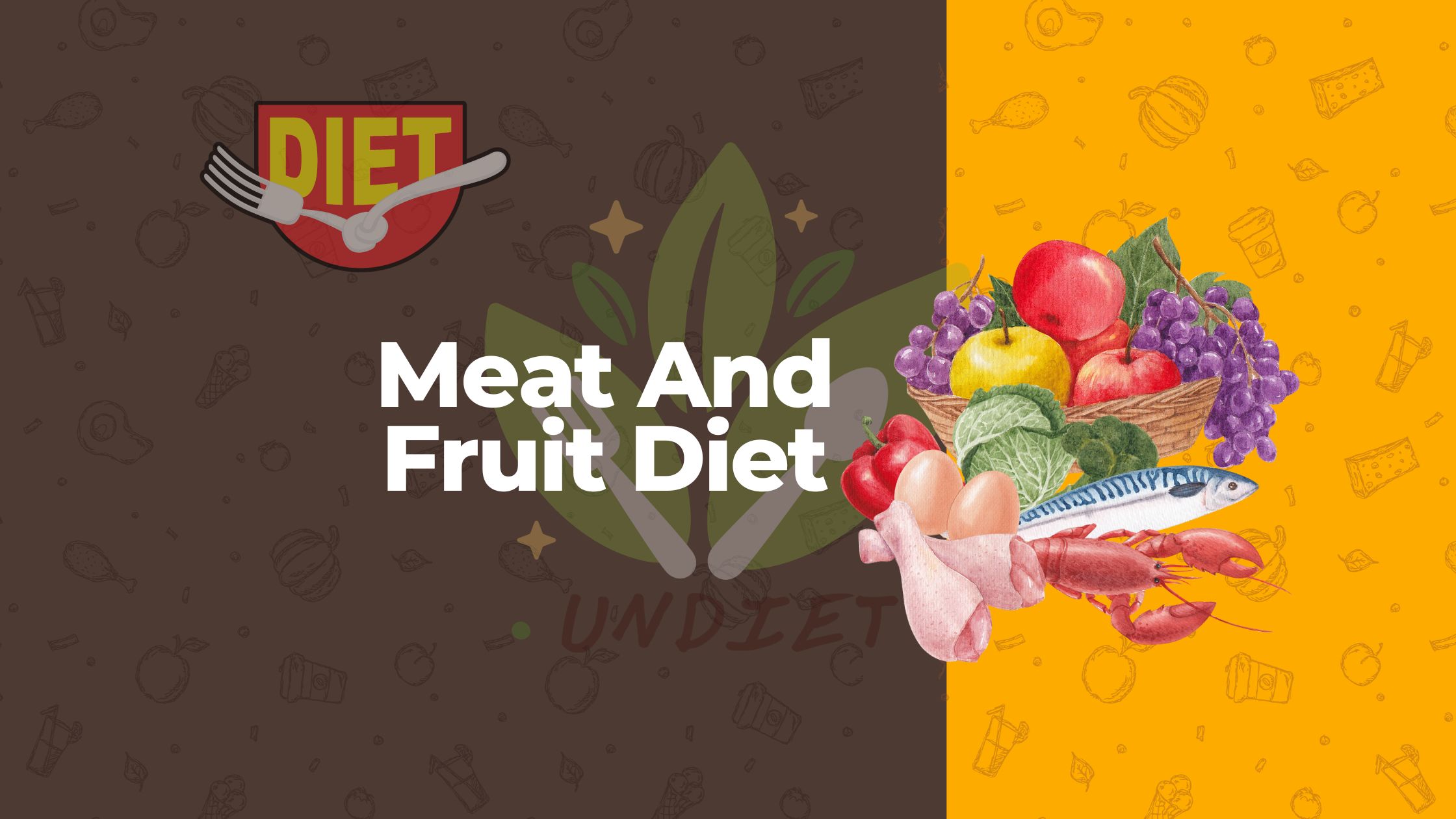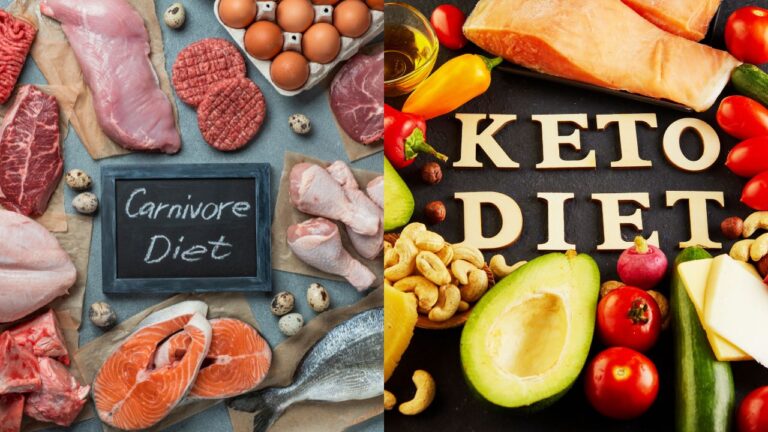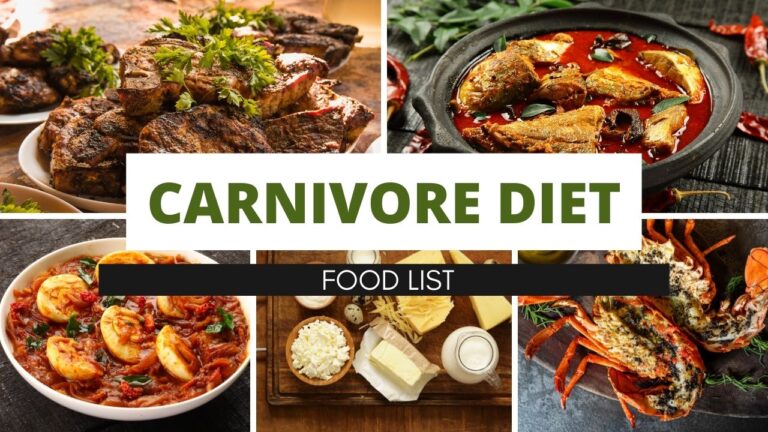Meat And Fruit Diet: Make Your Good Health And Energy!

A meat and fruit diet is a nutritional plan centered around consuming meat and fruit exclusively. This diet restricts the intake of other food groups, such as grains, dairy, and vegetables, and focuses on animal protein and natural sugars found in fruits.
Many proponents of this diet claim that it promotes weight loss, improves digestion, and provides essential nutrients. However, critics argue that it may lack important vitamins, minerals, and fiber, and may increase the risk of nutrient deficiencies and health conditions in the long run.
Ultimately, the decision to follow a meat and fruit diet should consider individual health needs, and preferences, and consultation with a healthcare professional.
What Is The Meat And Fruit Diet?
The meat and fruit diet involves consuming primarily meat and fruits, providing a balanced combination of essential nutrients to support overall health and wellness. It is a holistic approach to nutrition that emphasizes the importance of natural, whole foods for optimal well-being.
The Meat And Fruit Diet
Are you looking for a new way to boost your health and well-being? The meat and fruit diet might just be the answer you’ve been searching for. This unique eating plan involves consuming a combination of meats and fruits, providing a variety of nutrients and flavors to tantalize your taste buds.
Here, we’ll delve into the details of the meat and fruit diet, exploring its benefits, principles, and potential risks. So, let’s get started!
Benefits Of The Meat And Fruit Diet
- Diverse Nutrient Profile: With the meat and fruit diet, you can enjoy a wide range of essential nutrients from two major food groups – meat and fruit. This eating plan offers a variety of vitamins, minerals, proteins, and fiber, contributing to overall health and vitality.
- Weight Management: Many individuals adopt the meat and fruit diet as a means of maintaining or achieving a healthy weight. By focusing on lean meats and nutrient-rich fruits, this diet can help you feel fuller for longer, reducing the likelihood of overeating or snacking on unhealthy foods.
- Improved Digestion: The abundant fiber in fruits can promote healthy digestion. It aids in regulating bowel movements and preventing constipation, ensuring your digestive system is in optimal condition.
- Enhanced Energy Levels: Both fruits and meats are excellent sources of energy. Consuming them together provides a balanced combination that can help combat fatigue and keep you energized throughout the day.
Principles Of The Meat And Fruit Diet
- Variety of Fruits: Take advantage of the vast array of fruits available to you and incorporate a diverse range into your diet. From berries to tropical fruits, the more variety, the better. This way, you can ensure you’re obtaining a wide range of nutrients.
- Lean Meats: Focus on selecting lean cuts of meat, such as chicken, turkey, or lean beef. These provide high-quality protein without an excessive amount of saturated fat, contributing to a balanced and nutritious diet.
- Moderation: As with any diet, moderation is crucial. While fruits offer numerous health benefits, they do contain natural sugars. It’s essential to consume them in moderate quantities to maintain a balanced intake of macronutrients.
- Hydration: Stay hydrated by drinking plenty of water throughout the day. Adequate hydration is vital for overall health and can support the functioning of various bodily systems.
Potential Risks Of The Meat And Fruit Diet
- Nutrient Deficiencies: Depending solely on meat and fruit can increase the risk of certain nutrient deficiencies. For example, this diet may lack calcium, iron, and vitamin D, which are commonly found in other food groups. It’s important to monitor your nutrient intake and consider supplementation if necessary.
- Imbalanced Macronutrients: The meat and fruit diet may not provide an optimal balance of macronutrients, such as carbohydrates, proteins, and fats. It’s crucial to be mindful of your body’s needs and ensure you’re obtaining a well-rounded nutritional profile.
Remember, before embarking on any new dietary plan, it’s advisable to consult with a healthcare professional or registered dietitian. They can provide personalized guidance based on your individual needs and help ensure you’re following a diet that promotes overall health and well-being.
Where Did The Meat And Fruit Diet Come From?
The origins of the meat and fruit diet can be traced back to our early ancestors who relied on hunting and gathering for survival. This diet emphasizes the consumption of lean meats and fresh fruits, offering a natural and nutrient-rich approach to healthy eating.
The Meat And Fruit Diet Origin
The Meat and Fruit Diet, also known as the Carnivore Diet or the Ancestral Diet, has gained significant attention in recent years. This dietary approach emphasizes consuming primarily meat and fruits while excluding other food groups such as grains, dairy, and vegetables. But where did this diet originate? Let’s explore its origins and the principles behind it:
Indigenous Societies And Hunter-gatherers
- Hunter-gatherer societies: This diet draws inspiration from the dietary patterns of our ancestors, specifically hunter-gatherer societies. These societies predominantly relied on hunting wild game and gathering fruits, nuts, and berries.
- Nutrient-dense foods: The Meat and Fruit Diet emphasizes the consumption of nutrient-dense foods, aiming to replicate the diet followed by our ancestors.
- Evolutionary adaptation: Proponents of this diet argue that humans have evolved to thrive on a diet primarily composed of animal protein and plant-based foods found in the natural environment.
- Ancestral health movement: The Ancestral Health Movement, which gained traction in the early 2000s, played a pivotal role in popularizing the importance of ancestral diets like the Meat and Fruit Diet.
Evolutionary Biology And Anthropology
- Evolutionary biology perspective: Research in evolutionary biology suggests that early humans possessed adaptations that favored a diet rich in animal protein and essential nutrients.
- Anthropological evidence: Studies conducted among indigenous populations demonstrate their ability to remain healthy without consuming a wide range of fruits, vegetables, or grains.
- Nutritional necessities: Advocates of this diet argue that animal protein provides essential nutrients like complete proteins, vitamins (such as B12 and D), minerals (such as iron and zinc), and beneficial fats.
Modern Popularity And Controversy
- Rise in popularity: The Meat and Fruit Diet gained popularity through social media, word of mouth, and various health influencers who praised its potential benefits.
- Controversies and criticisms: Critics argue that excluding entire food groups like vegetables and grains could lead to nutrient deficiencies, while others express concerns regarding the environmental impact of a meat-centric diet.
- Limited long-term studies: Currently, there is a scarcity of long-term scientific studies investigating the potential health benefits and risks associated with this diet.
While the Meat and Fruit Diet has garnered attention and followers, it’s important to approach any new diet with caution. More research is needed to determine the long-term effects and sustainability of this dietary approach. As with any significant dietary changes, consulting a healthcare professional is advisable to ensure you meet your nutritional needs.
How To Start A Meat And Fruit Diet?
Looking to start a meat and fruit diet? Here’s a simple guide to get you started on this healthy eating plan. If you’re looking to embark on a meat and fruit diet, it’s important to have a clear understanding of how to get started. This unique approach to nutrition can provide a plethora of health benefits when followed correctly. Below, we outline some guidelines to help you kickstart your meat and fruit diet journey.
Planning Your Meals
- Begin by familiarizing yourself with the different types of meat and fruits that are suitable for your diet. Opt for lean cuts of meat and various fresh, seasonal fruits.
- Incorporate a range of protein-rich meats such as chicken, turkey, fish, and grass-fed beef into your meals.
- Experiment with different types of fruits, aiming for a colorful assortment to ensure a wide range of nutrients.
- Prioritize organic, locally sourced options when available, ensuring that your choices are free from pesticides and other harmful chemicals.
Structuring Your Diet
- Aim to have 3-4 small, balanced meals throughout the day rather than large portions.
- Include a serving of lean protein, such as grilled chicken or fish, in each meal.
- Add a variety of fruits either as a side or as part of your main dish to provide essential vitamins and minerals.
- Consider incorporating leafy greens and vegetables to complement the nutritional value of your meals.
- Avoid processed or canned meats and fruits, as they often contain additives and preservatives that can undermine your dietary goals.
Preparing Your Meals
- Invest in high-quality cooking equipment to ensure proper preparation of your meals.
- Experiment with different cooking methods, such as grilling, baking, or steaming, to retain the nutrients in both the meat and fruits.
- Use herbs, spices, and natural seasonings to enhance the flavors of your dishes without relying on unhealthy additives.
- Plan your meals ahead of time to save time and make it easier to adhere to your diet.
- Consider batch cooking and meal prepping to ensure you always have a nutritious meal ready, even on busy days.
Monitoring Your Progress
- Keep a food journal to track your daily intake of meats and fruits, ensuring you’re meeting your nutritional requirements.
- Monitor your energy levels, overall well-being, and any notable changes in your body composition.
- Consult with a healthcare professional or nutritionist to ensure that you’re meeting all your nutritional needs, especially if you have any specific dietary concerns or restrictions.
- Be patient with yourself as your body adjusts to this new way of eating. It may take some time to adapt, but the benefits can be well worth it.
Remember, it’s essential to listen to your body and make adjustments as needed. Everyone’s dietary needs and preferences are different, so tailoring your meat and fruit diet to suit your specific requirements is crucial. With careful planning and commitment, you can enjoy the health benefits that this unique diet has to offer.
What Can You Eat On A Fruit And Meat Diet?

On a fruit and meat diet, you can enjoy a variety of lean meats such as chicken, turkey, and fish, along with an assortment of fruits like berries, apples, and oranges. This diet offers a balanced mix of protein and essential nutrients, making it a healthy choice for those looking to achieve their fitness goals.
Are you considering adopting a fruit and meat diet? Wondering what food options are available? Look no further! We have compiled a detailed list of the foods you can enjoy while following this unique dietary approach. Read on to discover the exciting possibilities of a fruit and meat diet.
Options For Meat Lovers
When it comes to meat, you have a wide range of choices available. Here are the mouthwatering options you can savor on a fruit and meat diet:
- Lean cuts of beef: Opt for lean cuts like sirloin, tenderloin, or eye of round. These cuts are not only packed with protein but also offer great flavor.
- Chicken and turkey: Skinless chicken breasts and turkey cutlets are excellent choices. Rich in protein and low in fat, they provide essential nutrients to support your body.
- Fish and seafood: Seafood enthusiasts can indulge in nutrient-dense options like salmon, cod, shrimp, and crab. Besides adding variety to your diet, these options are also rich in Omega-3 fatty acids.
- Pork: Lean cuts of pork, such as tenderloin or center loin chops, can be enjoyed in moderation. However, trimming any visible fat is important to keep the overall fat content low.
Fruit Options To Complement Your Diet
To achieve a balanced fruit and meat diet, incorporating various fruits into your meals is essential. Here are some delectable fruits you can include in your daily diet:
- Berries: Whether it’s strawberries, blueberries, raspberries, or blackberries, berries make a delicious addition to your fruit and meat diet. Packed with antioxidants and essential vitamins, they offer a burst of flavor.
- Citrus fruits: Oranges, lemons, limes, and grapefruits are excellent choices. These fruits are not only refreshing but also provide ample amounts of vitamin C, boosting your immune system.
- Apples: Enjoy the crispness of apples while benefiting from their fiber content. They are a great source of antioxidants and can help regulate blood sugar levels.
- Tropical fruits: Pineapple, mango, papaya, and kiwi are delightful tropical fruits that can add a tropical twist to your diet. These fruits are loaded with vitamins and minerals, providing a refreshing change of taste.
As you can see, a fruit and meat diet offers a wide range of delicious and nutritious options. Incorporating lean meats and a variety of fruits ensures that you receive an array of essential nutrients while enjoying the flavors you love.
Experiment with different combinations to keep your meals exciting and satisfying. Embrace the benefits of a fruit and meat diet today and embark on a healthy and flavorful culinary adventure!
What Are The Benefits Of Eating A Meat And Fruit Diet?
Eating a meat and fruit diet can provide several benefits, such as a good protein source from meat and essential vitamins and fiber from fruits, promoting overall health and well-being.
Benefits Of Eating A Meat And Fruit Diet
A meat and fruit diet is gaining popularity for its numerous health benefits. Combining the essential nutrients from lean meats and the natural goodness of fruits can provide a well-rounded and nutritious eating plan. Let’s explore the benefits of incorporating a meat and fruit diet into your lifestyle.
Enhanced Nutritional Profile
- Combining meat and fruit ensures a diverse range of essential vitamins, minerals, and antioxidants.
- Meat offers high-quality protein, iron, zinc, and B vitamins, promoting muscle growth, a strong immune system, and energy production.
- Fruits provide essential vitamins, dietary fiber, and antioxidants, supporting overall health, and digestion, and combating free radicals.
Optimal Weight Management
- A meat and fruit diet can aid in weight loss and weight maintenance due to its high protein and fiber content.
- Protein-rich meat helps increase satiety and regulate appetite, reducing the tendency to overeat.
- Fiber in fruits promotes better digestion, prevents constipation, and supports a feeling of fullness.
Heart Health
- Incorporating lean meat, such as skinless chicken or fish, into your diet can improve heart health.
- These meats are low in saturated fat and cholesterol, contributing to a healthy cardiovascular system.
- Fruits like berries and citrus fruits are rich in antioxidants, vitamins, and minerals, promoting heart health and lowering the risk of heart disease.
Improved Digestion
- The combination of meat and fruits provides a good balance of macronutrients and fiber for optimal digestion.
- Protein from meat supports the digestive enzymes and promotes the breakdown of food.
- Fiber in fruits helps regulate bowel movements, prevents constipation, and maintains a healthy gut.
Increased Energy Levels
- The natural sugars present in fruits provide a quick energy boost without causing spikes in blood sugar levels.
- Lean meats contain essential amino acids that support muscle growth and energy production.
- Together, the combination of meat and fruits provides sustained energy throughout the day.
Enhanced Immune System
- The vitamins, minerals, and antioxidants from both meat and fruits contribute to a strong immune system.
- Meat provides essential nutrients like zinc and vitamin B6 that play a vital role in immune function.
- Fruits are rich in vitamin C, which strengthens the immune system and helps fight off infections.
Nutritional Variety
- A meat and fruit diet allows for a wide range of food options, ensuring a diverse and enjoyable eating experience.
- By incorporating different types of meat and a variety of fruits, you can obtain a broader spectrum of nutrients.
Reduced Risk of Chronic Diseases
- Following a balanced meat and fruit diet can lower the risk of chronic diseases, including obesity, diabetes, and certain types of cancer.
- The combination of lean meats and fruits provides essential nutrients that support overall health and well-being.
By adopting a meat and fruit diet, you can reap the benefits of a nutritious and enjoyable way of eating. Remember to consult with a healthcare professional or registered dietitian before making significant changes to your dietary habits. Start incorporating these healthy food choices into your meals, and experience the positive impact on your overall health and well-being.
Are There Any Side Effects Of Eating Only Meat And Fruit?
Eating only meat and fruit may have potential side effects. It is important to consider the potential lack of essential nutrients, such as fiber, vitamins, and minerals, which could lead to digestive issues and nutrient deficiencies.
Meat And Fruit Diet: Are There Any Side Effects Of Eating Only Meat And Fruit?
Following a meat and fruit diet has gained popularity in recent years. Proponents of this diet claim it offers a range of health benefits, such as weight loss, improved digestion, and increased energy levels. However, like any diet, it is crucial to consider the potential side effects before diving in.
In this section, we will explore the possible side effects of eating only meat and fruit.
Limited Nutrient Intake
- A meat and fruit diet eliminates several food groups, including grains, dairy, and vegetables. As a result, there is a risk of consuming inadequate amounts of essential nutrients like fiber, calcium, and vitamin C.
- Eliminating key food groups can lead to nutrient deficiencies and may require the use of supplements to meet daily nutritional needs.
Impaired Digestion
- Relying solely on meat and fruit can pose challenges to the digestive system. The absence of dietary fiber from grains and vegetables can lead to constipation and digestive discomfort.
- The high protein content in a meat-heavy diet can also burden the kidneys and contribute to issues such as bad breath, nausea, and even kidney stones.
Risk Of Nutritional Imbalance
- A diet centered around meat and fruit can create an imbalance in macronutrients. Excessive protein intake from meat may overshadow the consumption of carbohydrates and healthy fats, which are also essential for proper bodily function.
- This imbalance can lead to difficulty maintaining stable blood sugar levels, resulting in energy fluctuations and potentially impacting overall health and well-being.
Lack Of Variety
- Restricting the diet to only meat and fruit can become monotonous and potentially contribute to feelings of deprivation. The lack of diversity may make this diet less sustainable in the long term.
- Consuming a limited variety of foods may also limit the intake of certain phytonutrients and antioxidants found in other plant-based food groups, which are crucial for maintaining optimal health.
While a meat and fruit diet may have some potential benefits, it is important to approach it with caution due to its possible side effects. Nutritional deficiencies, impaired digestion, nutritional imbalances, and lack of variety are all considerations to keep in mind when following this eating approach.
As always, it is advisable to consult with a healthcare professional or registered dietitian before making significant changes to your diet.
Meat And Fruit Diet Carb Chart
Discover the Meat and Fruit Diet Carb Chart, an effective and balanced eating plan that focuses on incorporating meat and fruit into your meals. With this chart, you can easily track your carb intake and optimize your diet for better health and weight management.
If you’re considering adopting a meat and fruit diet, it’s important to understand the carbohydrate content of the foods you’ll be consuming. The meat and fruit diet emphasizes the consumption of lean meats and low-sugar fruits, making it relatively low in carbohydrates compared to other diets.
Here is a carb chart to help you navigate your way through this diet:
| Low carb fruit | Fructose content | Fiber content |
| Raspberries (½ cup) | 3 grams | 4 grams |
| Blackberries(½ cup) | 4 grams | 4 grams |
| Avocado(1 whole) | 4 grams | 14 grams |
| Strawberries (8 medium) | 6 grams | 2.8 grams |
| Plum(medium-sized) | 7 grams | 0.9 grams |
| Clementine (medium-sized) | 8 grams | 1.3 grams |
| Kiwi (medium-sized) | 8 grams | 2.1 grams |
| Cherries (½ cup) | 8 grams | 1.3 grams |
| Blueberries (½ cup) | 9 grams | 1.8 grams |
| Cantaloupe (1 cup) | 11 grams | 1.4 grams |
| Peach(medium-sized) | 13 grams | 3 grams |
Remember to consider portion sizes when including fruits in your diet, as some fruits may have slightly higher carbohydrate content. Consulting a nutritionist or dietitian can help you create a personalized meat and fruit diet plan that aligns with your specific needs and goals.
Embracing a meat and fruit diet may be an exciting journey towards a healthier lifestyle. By understanding the carbohydrate content of the foods you consume, you can make informed and mindful choices that support your overall well-being.
Frequently Asked Questions About Meat And Fruit Diet
What Is A Meat And Fruit Diet?
A meat and fruit diet is a dietary approach that primarily includes meat for protein and fruits for carbohydrates and vitamins.
What Are The Benefits Of A Meat And Fruit Diet?
A meat and fruit diet can provide essential nutrients, aid in weight loss, improve digestion, increase energy levels, and promote overall health and well-being.
Is A Meat And Fruit Diet Suitable For Everyone?
A meat and fruit diet may not be suitable for individuals with certain health conditions or dietary restrictions. It is advisable to consult with a healthcare professional before starting this diet.
How Can A Meat And Fruit Diet Support Weight Loss?
A meat and fruit diet can support weight loss by providing high-quality protein for muscle growth, increasing satiety, and reducing the intake of processed and unhealthy foods.
Are There Any Potential Risks Of A Meat And Fruit Diet?
A meat and fruit diet may result in nutrient deficiencies if not properly balanced. It is important to incorporate a variety of fruits, vegetables, and other food groups to ensure adequate nutrient intake.
Can A Meat And Fruit Diet Provide Enough Protein?
Yes, a meat and fruit diet can provide sufficient protein. Lean meats like chicken, turkey, and fish are excellent sources of protein.
How Can I Include A Variety Of Fruits In A Meat And Fruit Diet?
You can include a variety of fruits in your diet by consuming different types of fruits, experimenting with fruit-based recipes, and incorporating them into smoothies and salads.
Are There Any Alternatives To Meat On A Meat And Fruit Diet?
Yes, if you prefer to avoid meat, you can include plant-based protein sources like tofu, tempeh, lentils, beans, and legumes in your diet.
Can A Meat And Fruit Diet Be Sustainable In The Long Term?
A meat and fruit diet can be sustainable in the long term if properly planned and balanced with other food groups to ensure nutrient adequacy.
How Can I Get Started With A Meat And Fruit Diet?
To get started with a meat and fruit diet, plan your meals, including a variety of meats, fruits, and other nutritious foods. Seek guidance from a nutritionist or dietitian if needed.
Conclusion
To sum up, adopting a meat and fruit diet can offer numerous health benefits, with an emphasis on lean protein and nutrient-rich fruits. This eating approach promotes weight loss, improved gut health, and increased energy levels. Remember, it’s essential to consult a healthcare professional before making any drastic dietary changes.
So, why not give this diet a try and embark on a journey towards a healthier and more vibrant lifestyle? Start incorporating more meat and fruits into your meals and experience the positive impacts it can have on your well-being.






